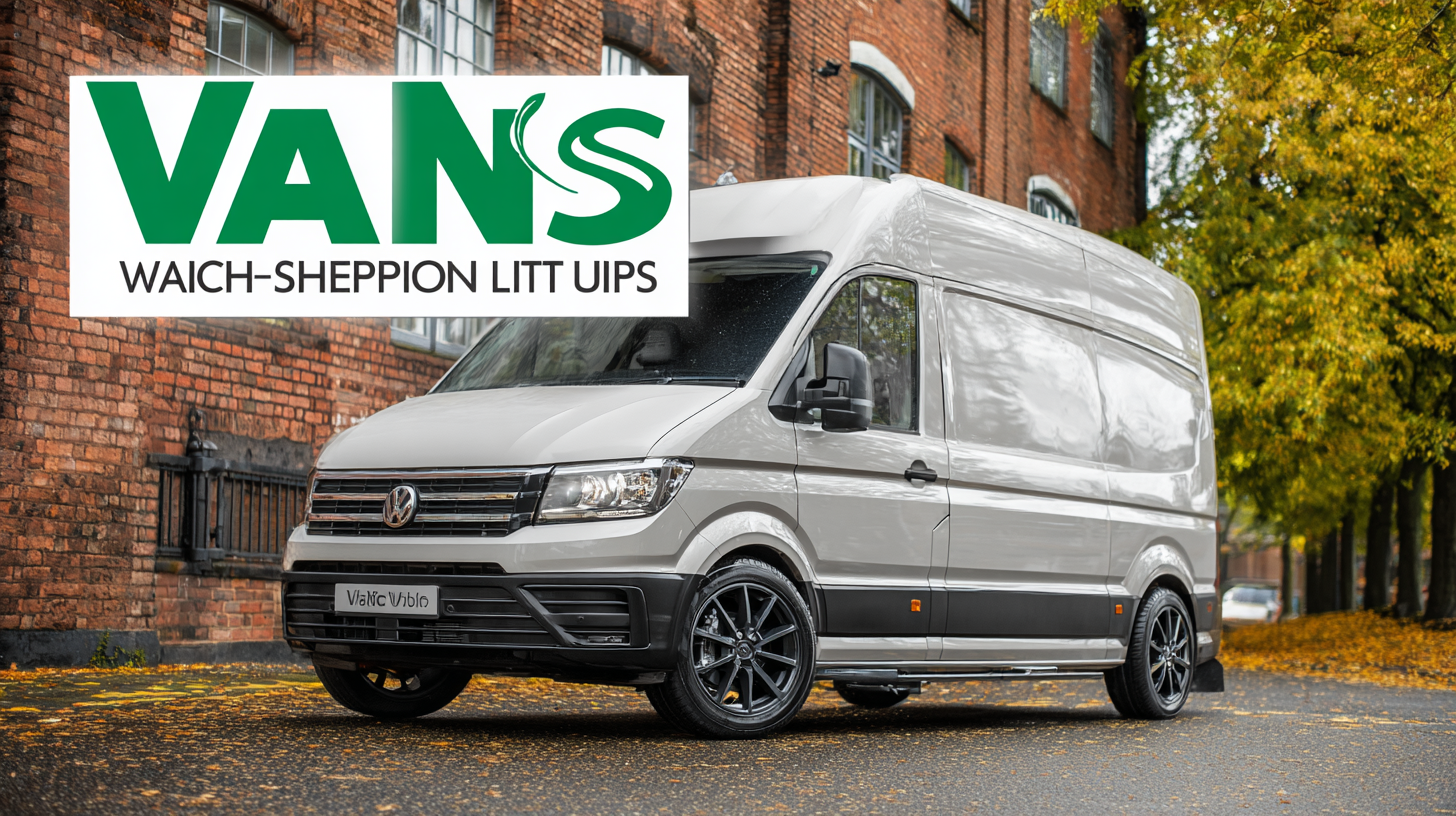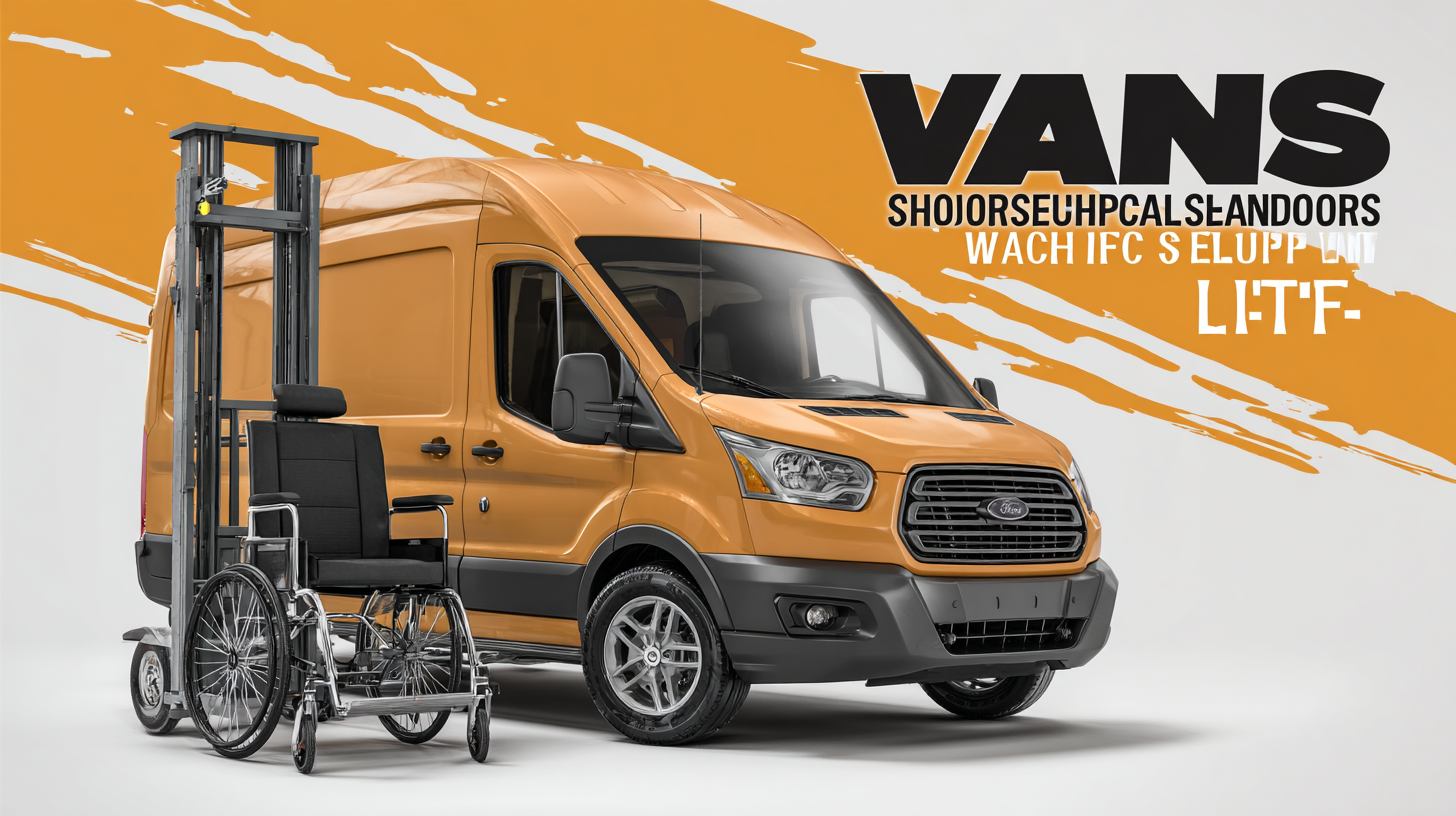The Ultimate Guide to Sourcing High Quality Suppliers for Best Vans With Wheelchair Lifts
As the demand for accessible transportation continues to rise, sourcing high-quality suppliers for Vans With Wheelchair Lifts has become a critical aspect for businesses and individuals alike. According to a recent report by the National Mobility Equipment Dealers Association (NMEDA), the market for wheelchair-accessible vehicles is projected to grow at a compound annual growth rate of 7.4% through 2025. This surge in demand highlights the necessity for reliable and efficient suppliers who can provide top-notch mobility solutions.
In order to navigate this complex landscape, it is essential to understand the key criteria for selecting suppliers, including their product quality, compliance with safety standards, and customer service. This ultimate guide aims to equip you with the essential tips and strategies for sourcing the best vendors in the industry, ensuring that you find the perfect Vans With Wheelchair Lifts to meet your mobility needs.
Identifying Key Features in Wheelchair Lift Vans for Quality Assurance
When sourcing high-quality wheelchair lift vans, identifying key features is essential for ensuring quality assurance and meeting the needs of users. According to a report by the National Mobility Equipment Dealers Association (NMEDA), approximately 3.6 million people in the U.S. require wheelchair assistance, highlighting the increasing demand for accessible transportation. One crucial feature to consider is the lift system; it should have a weight capacity that accommodates various wheelchair models – ideally rated for at least 800 pounds. This ensures safety and reliability for users.

Durability and ease of use are additional factors to evaluate. The wheelchair lifts should be constructed with robust materials, such as aluminum or steel, to withstand frequent use and adverse weather conditions. Furthermore, according to the Research Institute for Disabled Consumers, nearly 80% of wheelchair users find manual operation of lifts cumbersome. Therefore, investing in models that offer smooth automatic operation and user-friendly controls can greatly enhance the user experience. A thorough review of the van's safety features, including proper securing systems and non-slip surfaces, further supports quality assurance in wheelchair lift vans.
Evaluating Supplier Credentials: What to Look for in Your Partnerships
When evaluating potential suppliers for high-quality vans equipped with wheelchair lifts, it is crucial to scrutinize their credentials thoroughly. The Annual Cyber Threat Report indicates that neglecting cybersecurity in supply chains can lead to significant vulnerabilities. A substantial percentage of cyber threats emerge from third-party relationships; thus, businesses must implement robust screening protocols to assess their suppliers' security measures. Relying on outdated trust models is no longer viable; companies should adopt a proactive approach to evaluate the cybersecurity posture of their suppliers.
Moreover, sustainability is becoming a non-negotiable aspect of supplier evaluation. As noted in industry research, roughly two-thirds of an organization’s environmental, social, and governance (ESG) footprint is attributed to its supply chain. Procurement leaders are urged to prioritize partnerships with suppliers who demonstrate an earnest commitment to sustainable practices. This shift not only mitigates risk but also aligns with growing consumer demand for environmentally conscious products. Incorporating these criteria into your supplier evaluation process will improve your chances of building resilient and responsible partnerships in the marketplace.
The Ultimate Guide to Sourcing High Quality Suppliers for Best Vans With Wheelchair Lifts - Evaluating Supplier Credentials: What to Look for in Your Partnerships
| Supplier Location |
Years in Business |
Certifications |
Customer Ratings (Out of 5) |
Specialization |
| California, USA |
10 |
ISO 9001, NMEDA |
4.8 |
Wheelchair Accessible Vans |
| Texas, USA |
8 |
ISO 13485, NMEDA |
4.6 |
Custom Van Conversions |
| Florida, USA |
5 |
NMEDA |
4.5 |
Mobility Solutions |
| New York, USA |
15 |
ISO 9001 |
4.9 |
Accessible Vehicles |
Emerging Technologies in Wheelchair Lift Systems: Trends for 2025
As we look towards 2025, emerging technologies in wheelchair lift systems are set to reshape accessibility and enhance mobility for those who rely on these vital devices. One of the most exciting trends is the incorporation of smart technology, allowing wheelchair lifts to integrate more seamlessly with residential and commercial environments. These lifts will use data analytics and IoT devices to optimize performance and even predict maintenance needs, enhancing safety and reliability for users.
Tips for Choosing High-Quality Suppliers:
When sourcing suppliers for wheelchair lift systems, prioritize those that utilize cutting-edge technology in their products. Investigate whether they offer features such as remote monitoring and diagnostics, as these can significantly reduce downtime and maintenance costs.
Additionally, consider suppliers that are committed to sustainability practices. The growing focus on renewable energy sources in the lift manufacturing process not only benefits the environment but can also lead to more cost-effective operations in the long run. These technological advancements will not only enhance user experience but also ensure that suppliers stay competitive in the evolving market landscape.
Alternative Sourcing Strategies: Finding Unique Suppliers for Vans
When searching for high-quality suppliers for vans equipped with wheelchair lifts, it's essential to consider alternative sourcing strategies that can lead you to unique and reliable suppliers. Traditional supplier directories and online platforms often lead to a saturated market, making it difficult to identify standout options. One effective method is to explore niche industry events and trade shows specifically targeting adaptive vehicles. These gatherings not only showcase the latest innovations but also provide direct access to suppliers who specialize in accessibility solutions. Engaging directly with manufacturers and understanding their specific offerings can uncover hidden gems that are not widely advertised.
Another strategy is to leverage social media and online forums dedicated to the accessibility and mobility community. Platforms like Facebook groups and specialized websites allow for discussions and recommendations among users who have firsthand experience with various suppliers. By tapping into these communities, you can gather valuable insights and identify suppliers that prioritize quality and service. Additionally, reaching out to organizations that advocate for individuals with disabilities can offer leads on reputable suppliers known for their commitment to enhancing mobility. This grassroots approach can yield suppliers who understand the unique needs of wheelchair users and are dedicated to providing top-notch products.
The Quality of Suppliers for Vans with Wheelchair Lifts
This chart represents the assessment of supplier quality based on various criteria such as reliability, product quality, customer service, and price competitiveness. Each category is evaluated on a scale from 1 to 10.
Sustainability in Supplier Selection: Why It Matters for Your Fleet
In today's world, sustainability should be at the forefront of every business decision, especially when it comes to sourcing suppliers for essential assets like vans with wheelchair lifts. The push for sustainable practices is not just about enhancing corporate image; it's about creating an ethical framework that resonates with modern values and customer expectations. When selecting suppliers, it is crucial to prioritize those who demonstrate a commitment to environmentally friendly production processes, waste reduction, and energy efficiency. This not only reduces the carbon footprint of your fleet but also promotes a healthier planet for future generations.

Moreover, choosing sustainable suppliers can lead to long-term financial benefits. Often, suppliers that invest in sustainable practices are more innovative and proactive in their operations, leading to better quality products and services. They tend to have better risk management practices, ensuring that your supply chain is resilient and less prone to disruptions. By aligning your sourcing strategy with sustainable criteria, your fleet can operate more efficiently and responsibly while enhancing your brand's reputation among environmentally-conscious consumers. Ultimately, a thoughtful approach to supplier selection can yield both ethical and economic advantages, making sustainability a crucial consideration for any organization.
